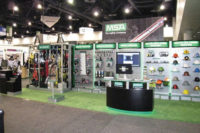Excluding the effect of weakening currencies and the company’s second quarter 2012 divestiture of its North American ballistic helmet business, net sales were a record, increasing $13 million, or 4.5 percent. Net income for the second quarter 2013 was $24 million, or $0.65 per basic share, a decrease of $4 million, or 14 percent, compared with $28 million, or $0.76 per basic share, for the same period last year.
Excluding after-tax restructuring expenses and foreign currency charges totaling $2 million, net income was $26 million, or $0.71 per basic share. Furthermore, excluding $5 million of after-tax income from asset sales in the second quarter of 2012, the company’s pro-forma net income this quarter was a record.
Driving global demand
“MSA’s consolidated second quarter results demonstrate continued success in executing our corporate strategy, a key element of which is driving global demand for the company’s core products,” said William M. Lambert, MSA president and CEO.
“When you exclude the impact of weakening foreign currencies, our quarterly revenue from MSA’s global core product groups — which include Head Protection, Fall Protection, Portable Gas Detection, Fixed Gas and Flame Detection, and Self-Contained Breathing Apparatus (SCBA) — increased 11 percent.” Mr. Lambert added that the company continued to see favorable results from its efforts to manage manufacturing costs and improve product mix.
For the current quarter, gross profit margins improved 250 basis points helping to drive operating income improvement of 16 percent when compared to the second quarter
of 2012.
North American sales up $7 million
On a geographic basis, second quarter sales in the company’s North American segment increased $7 million, or 5 percent, versus the same period of 2012. Excluding the impact of the ballistic helmet divestiture in the second quarter of 2012, North American segment sales increased $12 million, or 8 percent, when compared to the same period of 2012. Sales of fixed gas and flame detection instruments, portable gas detection instruments and breathing apparatus increased $8 million, $4 million and $3 million, respectively, on higher shipments to the industrial and fire service markets.
These increases were partially offset by a $2 million decrease in gas mask sales to the military.
Sales in the company’s European segment decreased $1 million, or 1 percent, when compared to the second quarter of 2012. Excluding a favorable currency translation impact of $1 million, local currency sales decreased $2 million. The decline was related to weakness in the fire service and military markets, notably in France and Italy, partially offset by strength in industrial markets throughout Europe.
Sales in MSA’s International segment decreased $1 million, or 2 percent, versus the same period of 2012. Excluding an unfavorable currency translation impact of $4 million, International segment local currency sales increased $3 million, or 4 percent, from the second quarter of 2012. Local currency sales of portable gas detection instruments, fall protection products and fixed gas and flame detection instruments to industrial markets increased $2 million, $1 million and $1 million, respectively. These improvements were partially offset by declines across a range of other product groups.
Net income in MSA’s North American segment increased $1 million in the second quarter of 2013. This increase reflects improved product margins on a higher level of core product sales and a lower effective tax rate, partially offset by increased research and development costs and higher selling, general and administrative expenses.
Future focus
“Our strategic focus on developing business from MSA’s core product lines continues to generate strong results,” Mr. Lambert said. “While business conditions do remain challenging, our strategy is succeeding,” he said. “As we head into the second half of the year, our focus remains on driving demand for our core products, reducing manufacturing and operating costs, and accelerating our development of innovative safety products and instruments. We have meaningful opportunities on each of these fronts, and we will continue to advance these initiatives in ways that equally benefit our customers and our shareholders,” Mr. Lambert concluded.


